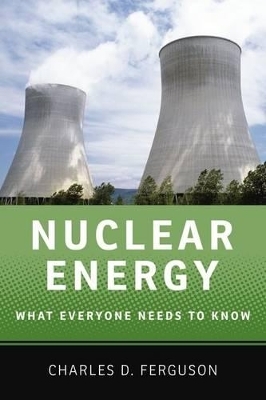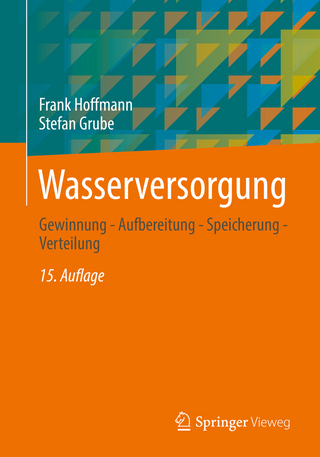
Nuclear Energy
Oxford University Press Inc (Verlag)
978-0-19-975945-3 (ISBN)
For decades, the use of nuclear energy has been extremely controversial. Worries about the dangers that nuclear plants and their radioactive waste posed to nearby communities grew over time, and plant construction in the United States virtually died after the early 1980s. The 1986 disaster at Chernobyl only reinforced nuclear power's negative image. Yet in the decade prior to the Japanese nuclear crisis of 2011, sentiment about nuclear power underwent a marked change. The alarming acceleration of global warming due to the burning of fossil fuels and concern about dependence on foreign fuel has led policymakers, climate scientists, and energy experts to look once again at nuclear power as a source of energy.
In this accessible overview, Charles D. Ferguson provides an authoritative account of the key facts about nuclear energy. What is the origin of nuclear energy? What countries use commercial nuclear power, and how much electricity do they obtain from it? How can future nuclear power plants be made safer? What can countries do to protect their nuclear facilities from military attacks? How hazardous is radioactive waste? Is nuclear energy a renewable energy source? Featuring a discussion of the recent nuclear crisis in Japan and its ramifications, Ferguson addresses these questions and more in a book that is essential for anyone looking to learn more about this important issue.
Charles D. Ferguson is President of the Federation of American Scientists and an Adjunct Professor in Georgetown University's Security Studies Program. Trained as a physicist and nuclear engineer, he has worked on nuclear policy issues at the U.S. Department of State and the Council on Foreign Relations.
Contents ; Preface ; Acknowledgements ; 1. Fundamentals ; What is energy, and what is power? ; Is most energy that people use derived from nuclear energy? ; What is the origin of nuclear energy? ; What is radioactivity? ; Why is ionizing radiation a health concern? ; What is radioactive half-life, and how can knowing it help increase countries' security? ; How much more energetic is nuclear energy compared to chemical energy? ; Why has it been so difficult to commercialize nuclear fusion? ; How was nuclear fission discovered? ; What role, if any, did Albert Einstein play in the discovery of nuclear energy? ; What is a fission chain reaction? ; What is uranium, where did it come from, and how was it discovered? ; What is plutonium, how was it discovered, and how hazardous is it? ; Why can't nuclear reactors explode like a nuclear bomb? ; What is the nuclear fuel cycle? ; Why are certain activities in the nuclear fuel cycle called "dual-use"? ; What are the various uranium enrichment methods? ; What are the nuclear proliferation concerns of uranium enrichment? ; What is the thorium fuel cycle? ; How does a nuclear reactor generate electricity? ; How many people's electricity demands could be supported with one large nuclear reactor? ; What are the different types of nuclear reactors used for electricity generation? ; Why were only a few types of reactor designs chosen for the present fleet of reactors? ; What are the Generation IV reactors, and why are they considered potentially revolutionary? ; What can nuclear reactors do besides generate electricity? ; 2. Energy Security and Costs of Building Power Plants ; What is energy security? ; Is energy independence feasible? ; Have countries ever been shut out of the nuclear fuel market? ; Are many European countries too dependent on Russian energy supplies? ; What role has nuclear energy played in reducing certain countries dependence on fossil fuels? ; How could nuclear energy further reduce dependence on fossil fuels? ; What countries use commercial nuclear power, and how much electricity do they obtain from it? ; How many more countries may acquire commercial nuclear power plants? ; How do the costs of nuclear plants compare to other types of power plants? ; How can nuclear power plants be made more cost competitive? ; Why is it difficult for the supply chain to keep up with the various forecasts of demand for new nuclear plants? ; How many skilled people are required to build and operate nuclear plants? ; Can nuclear power plant construction keep pace with the increasing demands for electricity? ; Will the world run out of uranium and if so, when? ; Why have some countries pursued reprocessing of spent nuclear fuel for commercial purposes? ; Why did the United States decide to not pursue reprocessing, and will it revive this practice? ; 3. Climate Change ; What is the greenhouse effect? ; What is the difference between global warming and climate change? ; What are the observed and forecasted effects of climate change? ; What can people do to reverse excess global warming? ; Why don't nuclear plants emit greenhouse gases? ; Why does the nuclear fuel cycle emit some greenhouse gases? ; How much greenhouse gases have nuclear power plants prevented being emitted that would otherwise have been emitted from coal or natural gas plants? How many additional nuclear plants would be needed to make a further major reduction in greenhouse gas emissions? ; Have nuclear power plants ever been built as fast as would be needed to make another major reduction in greenhouse gas emissions? ; Will global warming actually reduce the ability to use nuclear power plants to their full capacity? ; Should nuclear power be considered a "clean" energy source for climate change agreements among nations? ; What are the differing views among environmentalists on nuclear power? ; 4. Proliferation ; What is nuclear proliferation? ; Which countries have developed nuclear weapons, and how did they do it? ; How many nuclear weapons do the nuclear-armed countries have? ; How much weapons-usable fissile material is available worldwide and where is it located? ; Has a country ever completely dismantled or given up its nuclear arsenal? ; What is the nonproliferation regime? ; What is the nuclear Non-Proliferation Treaty (NPT)? ; What is the International Atomic Energy Agency, and what role does it play in preventing proliferation? ; What are nuclear safeguards, and how have they evolved? ; Are nuclear safeguards effective? ; What is the Nuclear Suppliers Group? ; Has commercial nuclear power ever been used to make nuclear weapons? ; What can be done to prevent proliferation? ; Can the nuclear fuel cycle be made more proliferation-resistant? ; Can terrorists make nuclear weapons? ; What can be done to prevent nuclear terrorism? ; 5. Safety ; What is nuclear safety? ; How safe is safe enough, and what is safety culture? ; What is the defense-in-depth safety concept? ; What are the major types of nuclear accidents? ; How is nuclear safety measured? ; How safe are today's nuclear power plants? ; Should a country choose one or at most a few plant designs instead of multiple plant designs, and what are the implications of such a choice? ; What is the China syndrome? ; How did the Three Mile Island accident happen and what were the consequences? ; How did the Chernobyl accident happen and what were the consequences? ; What happened to Soviet-designed reactors after the Chernobyl accident? ; How did the nuclear industry form self-policing organizations? ; Can the nuclear industry survive if another major accident occurs? ; How long can nuclear power plants operate? ; How can future nuclear power plants be made safer? ; Can nuclear power expand too fast to keep plants safe? How can nuclear facilities be made resistant to natural disasters such as earthquakes and tsunamis? ; How did the Fukushima Daiichi accident happen? ; Were there design flaws in the Fukushima Daiichi reactors and were there safety concerns prior to the accident? ; What are the concerns about nuclear safety culture in Japan? ; What are the likely implications for the nuclear industry as a result of the Fukushima Daiichi accident? ; Why did the Fukushima Daiichi accident raise renewed concerns about the use of plutonium in nuclear fuel? ; 6. Physical Security ; What is nuclear security? ; What is a design basis threat assessment? ; How are safety and security different? ; Why would someone or some group attack a nuclear power plant or related nuclear facilities such as spent fuel pools? ; Who would attack nuclear facilities? ; What are the potential modes of attack or sabotage, and what has been done to protect against them? ; What more can be done to strengthen security of existing and future facilities? ; What military attacks have there been on nuclear reactors? ; What can countries do to protect their nuclear facilities from military attacks? ; 7. Radioactive Waste Management ; What are the types of radioactive waste, and how are they generated? ; What is the typical composition of spent nuclear fuel? ; How long does the radioactivity in spent fuel last? ; How hazardous is radioactive waste? ; How much spent nuclear fuel has been produced? ; What are the storage options for dealing with radioactive waste? ; What is the volume of radioactive waste, how does this compare to other industrial toxic waste? ; How vulnerable are spent fuel pools? ; Does reprocessing reduce the amount of nuclear waste? ; How do nuclear plants and coal plants compare in terms of radioactivity emitted? ; How hazardous is the transportation of radioactive waste? ; Why was Yucca Mountain chosen as the permanent repository in the United States, and what will be its fate? ; Will delays in opening up permanent repositories for radioactive waste derail continued or expanded use of nuclear power? ; 8. Sustainable Energy ; Why is meant by a sustainable energy system? ; What is a renewable energy source? ; Is nuclear energy a renewable energy source? ; Can nuclear energy contribute to developing sustainable energy systems? ; Can renewable energies compete with nuclear and other base-load electrical power sources?
| Erscheint lt. Verlag | 13.9.2012 |
|---|---|
| Reihe/Serie | What Everyone Needs To Know® |
| Verlagsort | New York |
| Sprache | englisch |
| Maße | 208 x 145 mm |
| Gewicht | 340 g |
| Themenwelt | Naturwissenschaften ► Biologie ► Ökologie / Naturschutz |
| Sozialwissenschaften ► Politik / Verwaltung ► Staat / Verwaltung | |
| Technik ► Elektrotechnik / Energietechnik | |
| ISBN-10 | 0-19-975945-6 / 0199759456 |
| ISBN-13 | 978-0-19-975945-3 / 9780199759453 |
| Zustand | Neuware |
| Informationen gemäß Produktsicherheitsverordnung (GPSR) | |
| Haben Sie eine Frage zum Produkt? |
aus dem Bereich


